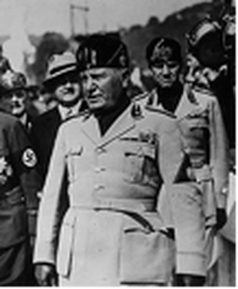By Alex Patterson
BIOGRAPHY--Benito Mussolini was born on July 29th 1883. He lived near Predappio, in Northeast Italy. His father, Alessandro, was a blacksmith, and his mother, Rosa, was a school teacher. The family of five was poor along with many other Italian families. Despite that, he saw his father as a role model.
Alessandro was a socialist and a republican. He believed that there should be a fairer share of wealth in Italy and that the monarchy should be eliminated. Alessandro wanted the people to decide who should lead them and he was very nationalistic. He also believed that the Roman Catholic Church was the enemy of Italy.
In June 1902, Mussolini went to Switzerland and learned about socialism. He worked as bricklayer and joined a trade union. He got kicked out of Switzerland when he tried to start a revolutionary strike. He returned to Italy to do his military service. In 1911, the Italians attacked Libya in North Africa. Mussolini led demonstrations against this attack in Forli. He was arrested and sent to prison for five months. He got noticed for his work as a radical demonstrator and became very popular as the editor of a socialist newspaper. Mussolini headed a group of fascists and nationalists and became more popular as a leader. He became leader in 1922 after being appointed president by King Victor Emmanuel. He becomes a dictator.
PERSONALITY— His personality was very disturbed. As a child he was expelled from school because he stabbed a student. He had a large ego and he was violent. He learned public speaking and he was able to inspire people around him.
TIMELINE--
· 1912 In July, Mussolini is elected to the executive committee of the socialist party
· 1914 On July 29, Mussolini signs a non-aggression/anti war manifest on behalf of his party. However, in October he joins the proponents of war and calls for Italy's participation in WW1.
· 1915 On August 31 Mussolini joins the army. He marries Rachele Guidi;
· 1917 In February, Mussolini is promoted to master sergeant and is severely wounded shortly thereafter
· 1919 On March 23d Mussolini co-founds the "fascist comity", a right-wing association of veterans.
· 1922 At the heights of the political crises between October 27 and October 30 (which is also plagued by a mass strike), Mussolini takes advantage of the wide-spread fear for a revolution and openly threatens to overturn the government. (March on Rome).
· 1924 April 6, following Mussolini's new election law the "fascists" gain a two thirds majority during parliamentary election;
· 1925 January 3, Mussolini claims fascist's responsibility for the murder of Giacomo Matteotti (1885-1924), a member of the socialist opposition
· 1926 Ban of all parties other then the Fascist National Party ("PNF"), establishment of special courts focusing on suppression of any opposition. Several attempts on Mussolini's life are unsuccessful;
· 1928 Foundation of the "Fascist Council"
QUOTES
“Fascism is a religion. The twentieth century will be known in history as the century of Fascism.”
Analysis—Mussolini believed fascism was not a political party, but was a way of life. He believed it was a moral law that bound people together into a mission and vision. He believed fascism would dominate the world.
“Democracy is talking itself to death. The people do not know what they want; they do not know what is the best for them. There is too much foolishness, too much lost motion. I have stopped the talk and the nonsense. I am a man of action. Democracy is beautiful in theory; in practice it is a fallacy. You in America will see that some day.”
Analysis— as IL Duce, Mussolini thought he knew what was best for the population of Italy. He believed that democracies bred laziness and pacifism only by war and decisive action could a man and a nation reach their potential. Fascism is opposed to the doctrines of liberalism and democracy.

